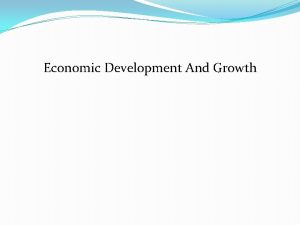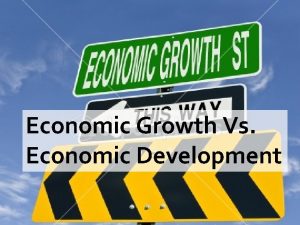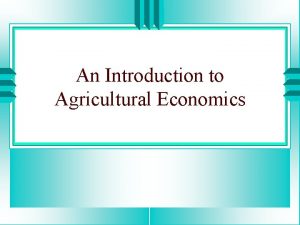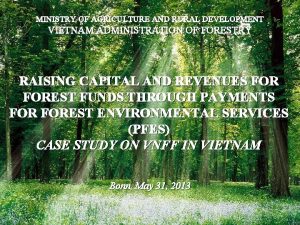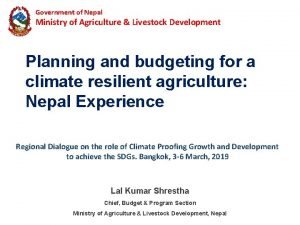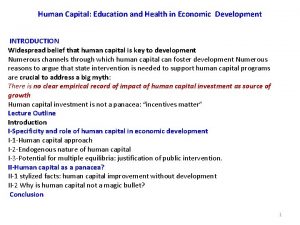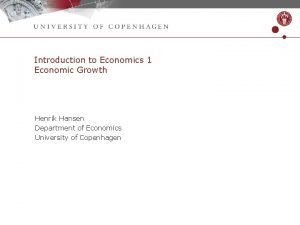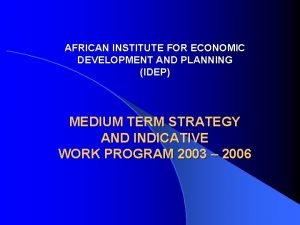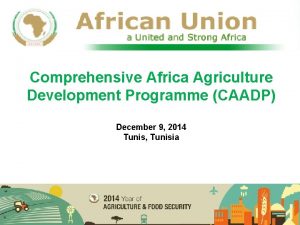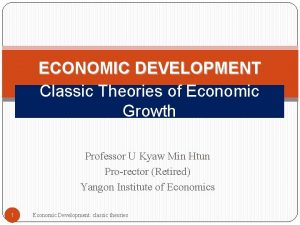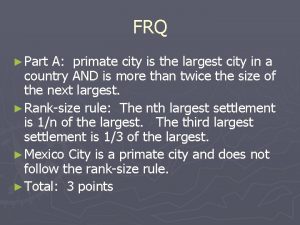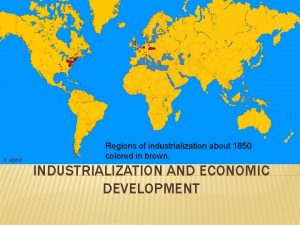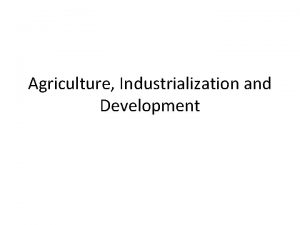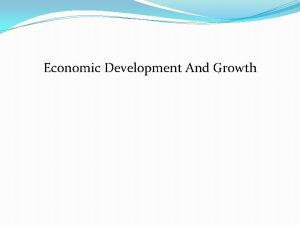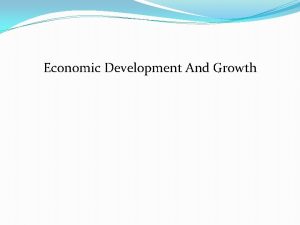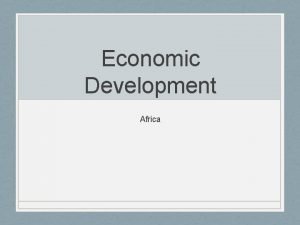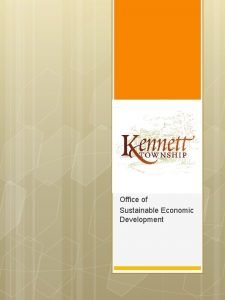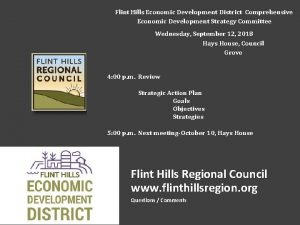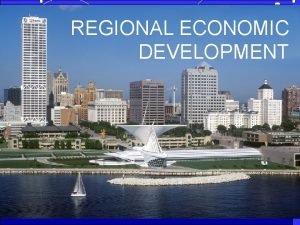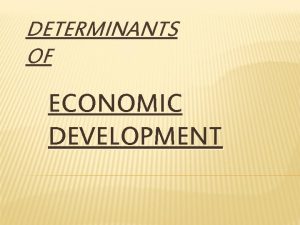AGRICULTURE AND ECONOMIC DEVELOPMENT What is Agriculture Agriculture



















- Slides: 19

AGRICULTURE AND ECONOMIC DEVELOPMENT: What is Agriculture? Agriculture

AGRICULTURE AND ECONOMIC DEVELOPMENT cont… • Until recently, agriculture in Western Economic Development theory was viewed largely as a passive and supportive sector of the economy. • Basically, its role was viewed as being to provide sufficient food to the growing population and release “surplus labour to the industrial sector, which is supposed to be the dynamic leading sector of the economy.

AGRICULTURE AND ECONOMIC DEVELOPMENT cont… • Presently however, economists have realized that far from playing a passive and supportive role, the agricultural sector and the rural economy as a whole need to be dynamic and leading elements of the overall development strategy, at least for the contemporary Third World countries (Todaro, 1989).

AGRICULTURE AND ECONOMIC DEVELOPMENT cont… • Agricultural production in sub-Saharan African countries is not only important but basic to their survival if development is to take place and / or if the present level of civilization is to be maintained and enhanced. • This is basically because the pace and intensity of industrialization as experienced elsewhere in the world is at such a low level in Africa.

AGRICULTURE AND ECONOMIC DEVELOPMENT cont… • Most of the countries lack mineral deposits to earn any substantial revenue to developmental programs. • Even for countries with sufficient mineral resources, inept political institutions and socioeconomic policies have stalled their capability to tackle the problem of poverty and food security particularly in the rural areas where the majority of the people live in. • Most important, these countries have abundant resources of land labour to develop the agriculture sector.

AGRICULTURE AND ECONOMIC DEVELOPMENT cont… • For example, it is known that 16% of the total African land area is considered suitable for agriculture but only 6% is cultivated (Meier, 1984). • In the earlier days of development planning there was much advocacy for a deliberate and rapid industrialization strategy. • However, experience has shown that limitations of emphasizing industrialization needs to increasingly recognize that agricultural progress must have a vital role in the development process in a number of developing countries.

AGRICULTURE AND ECONOMIC DEVELOPMENT cont. … v Agriculture in Uganda. • In Uganda, agriculture is the main star of the economy. • By 1996, the agricultural sector accounted for 49% of real GDP and contributed over 60% of total export earnings. • The majority of households (over 80%) derive their livelihood from agriculture and related activities (Background to the Budget, 1996/97). • The main activities within the agricultural sector include: food and cash crop production, livestock, fisheries, and forestry.

AGRICULTURE AND ECONOMIC DEVELOPMENT cont. … v Agriculture in Uganda. • Of all the food and export crops, only tea and sugar are grown on large estates. • The agricultural sector in Uganda is dominated by food crop production , which accounts for 71% of agricultural GDP; and livestock products 17% ( average 1989 -91). Export crop production is only 5% of agricultural GDP, the fisheries subsector accounts for 4%, and forestry for 3%. • Despite this composition government policies have, for a long time been directed almost exclusively towards the export crop production as compared to 2/3 of livestock production and all export crop output.

The Unique nature of agricultural Sector: • It is generally agreed that understanding the nature of agriculture is fundamental in designing and achieving developmental objectives. • For instance, the problem of income distribution and extreme poverty in LDCs is basically a question of how to improve on the well being of the rural people. • First, the agricultural sector in a country at the early stages of development employs far more people than all other sectors put together. In Uganda for instance up to 80% of the workforce is engaged in agriculture.

The Unique nature of agricultural Sector: • In contrast, agriculture in developed economies typically employees less that 10% of the work force; for example, 3% in the US (Gillis, et al 1996). • The second aspect is that agricultural activities have existed for a long time dating back to the time when humankind gave up hunting and gathering as its main source of food. • Crops are grown using traditional techniques developed much before the advent of modern science. • more fundamentally, agriculture is the only sector that produces food. Humankind can survive without steel or iron but not without food. Either food must be produced in a country or imported; it cannot be substituted.

Characteristics of Agricultural Production in Developing Countries: q Rudimentary tools such as the hand hoe are used in production. There is widespread lack of mechanization. q Farmers are smallholders, scattered and highly decentralized in decision making. q Agriculture involves risks of weather and risk aversion of the farmers in adopting new varieties method of farming. q Dependence on family labour. q Farmers are producers and consumers of their own output at the same time. q Low productivity, given the poor techniques of production.

Contribution of Agriculture to Development: Ø In most, if not all developing countries, agriculture plays an important role and forms the backbone of these economies. Ø In Uganda, agriculture contributes over 70% of total GDP and about 80% of the total population (households) is employed in Agriculture and related activities. Ø Supply of foodstuffs and raw materials to other sectors of the economy.

Contribution of Agriculture to Development cont… Ø Another role is forming a market for industrial products such a farm tools and implements, fertilizers, and farm machinery. Ø Growth in agriculture output relaxes foreign exchange constraints by either earning foreign exchange through exports or by saving foreign exchange through import substitution (importation of capital goods instead). Ø An expanding agricultural sector generates more productive employment, increases rural incomes and improves the general welfare of the rural population.

Contribution of Agriculture to Development cont… • Considering these various contributions of agriculture, development economists such as Eicher (1989) and Cleaver (1993) have argued that if there is to be in the long run, a structural transformation in output and labour force in developing economies into other sectors, there must be in the short-run, successful policies of agricultural development to facilitate this transformation.

Arguments for Agricultural development in LDCs: • In its traditional form common to LDCs, agriculture requires less capital investment in form of farm inputs like hoes, pangas, seeds and fertilizers. • For LDCs with acute lack of sufficient investible funds, agricultural production is more ideal. • agriculture does not require highly skilled labour to be successful. • Another argument has been that agriculture as a source of income has the potential to redistribute income more equitably ( B’se majority live In rural area)

Arguments for Agricultural development in LDCs cont… • Furthermore, agriculture production is more flexible with respect to location and infrastructure requirements ( not the case with industries).

Bottlenecks to Agricultural Development in LDCs: • Lack of credit to secure farm inputs and implements. • Land Tenure System, Soil Types and Topology. • Social – Cultural, traditional ways of living (e. g Karamoja). • Pricing and Marketing Problems. • Lack of extension services (e. g leads to lack knowledge of use of fertilizers and chemical application).

Why there is need for Industrialization than Agriculture in LDCs: • Industrialization is a pre-requisite for economic development as the history of advanced countries shows. • In overpopulated LDCs there is overcrowding on the land, holdings are subdivided and fragmented, and farmers practice traditional agriculture. For rapid development, LDCs cannot afford to wait for changes in farm practices to take place. Therefore, LDCs must begin with industrial development to supply fertilizers, farm machinery and other inputs so as to increase efficiency on the farm. • Industrialization is necessary in order to provide employment to the underemployed and unemployed in the agricultural sector.

Why there is need for Industrialization than Agriculture in LDCs cont… • Industrialization is also essential in LDCs because it brings increasing returns and economies of scale while agriculture does not (rural societies tend to stagnant). • The LDCs need industrialisation to free themselves from the adverse effects of fluctuations in the prices of primary products and deterioration in their terms of trade. • The case of industrialisation in the LDCs also rests on the psychological boost which such a policy provides to their citizens in marching towards modernization.
 Growth and development conclusion
Growth and development conclusion Economic growth vs economic development
Economic growth vs economic development Importance of agriculture economic
Importance of agriculture economic Economics unit 1 lesson 2 difficult choices
Economics unit 1 lesson 2 difficult choices Ministry of agriculture and rural development cameroon
Ministry of agriculture and rural development cameroon Ecotourim
Ecotourim Ministry of agriculture and livestock development
Ministry of agriculture and livestock development Human capital education and health in economic development
Human capital education and health in economic development Economic growth and development
Economic growth and development Ministry of economic development job creation and trade
Ministry of economic development job creation and trade African institute for economic development and planning
African institute for economic development and planning Agriculture development
Agriculture development Wake county economic development
Wake county economic development Economic social development
Economic social development Northern waterfront economic development initiative
Northern waterfront economic development initiative Economic social development
Economic social development Hollis chenery
Hollis chenery Primate city frq
Primate city frq Canadian community economic development network
Canadian community economic development network Ward economic development corporation
Ward economic development corporation
